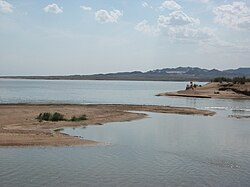Minqin County
Minqin County
民勤县 | |
|---|---|
 | |
| Coordinates: 38°37′26″N 103°05′38″E / 38.624°N 103.094°E | |
| Country | People's Republic of China |
| Province | Gansu |
| Prefecture-level city | Wuwei |
| Time zone | UTC+8 (China Standard) |
Minqin County (Chinese: 民勤县; pinyin: Mínqín Xiàn) is a county of Gansu province, the People's Republic of China. It is under the jurisdiction of Wuwei City. Its postal code is 733300, and its population in 1999 was 281,826 people.
In older literature, today's Minqin is referred to as Zhenfan (Chinese: 镇番; Wade–Giles: Chen-fan).[1] According to Pyotr Kozlov, the Mongol name for the city was Sogo Khoto.[2]
Geographically, Minqin county occupies one of Gansu's panhandles, bordering in the north, east, and southeast on the Alashan League of Inner Mongolia.
History
Historically, Chinese agricultural settlement in the area was made possible by the Shiyang River, flowing from the Qilian Mountains.[3] However, the livelihood of Chinese farmers here was often precarious; in the 1920s it was considered as somewhat of a regular famine district.[1] Large number of Zhenfan people, nicknamed "Sand-hollow Mice", worked as "camel-pullers" with caravans owned by Mongols from the adjacent Alashan, or moved—temporarily or permanently—to Xinjiang. For example, as of 1926, the main population of the small oasis of Santanghu (now, officially, Santanghu (三塘湖乡) in what's today Barkol Kazakh Autonomous County of Xinjiang were migrants from Minqin (Zhenfan) and their descendants.[4]
By the late 20th century, the environmental situation in the Minqin area deteriorated, as smaller amounts of the Shiyang River water reached the area, due to the increased irrigation of use of it upstream. Ground water levels fell, and desertification became a serious threat.[3] Minqin is now identified as one of the major sources of sandstorms in China.[3][5]
Geography
| Climate data for Minqin County (1981−2010 normals) | |||||||||||||
|---|---|---|---|---|---|---|---|---|---|---|---|---|---|
| Month | Jan | Feb | Mar | Apr | May | Jun | Jul | Aug | Sep | Oct | Nov | Dec | Year |
| Mean daily maximum °C (°F) | −0.4 (31.3) |
3.9 (39.0) |
10.7 (51.3) |
18.7 (65.7) |
24.6 (76.3) |
28.9 (84.0) |
30.9 (87.6) |
29.2 (84.6) |
23.7 (74.7) |
16.6 (61.9) |
8.2 (46.8) |
1.2 (34.2) |
16.3 (61.5) |
| Daily mean °C (°F) | −8.1 (17.4) |
−3.8 (25.2) |
3.1 (37.6) |
11.0 (51.8) |
17.3 (63.1) |
21.7 (71.1) |
23.7 (74.7) |
21.9 (71.4) |
16.3 (61.3) |
8.6 (47.5) |
0.4 (32.7) |
−6.2 (20.8) |
8.8 (47.9) |
| Mean daily minimum °C (°F) | −14.5 (5.9) |
−10.5 (13.1) |
−3.8 (25.2) |
3.5 (38.3) |
9.6 (49.3) |
14.2 (57.6) |
16.6 (61.9) |
15.2 (59.4) |
9.8 (49.6) |
2.0 (35.6) |
−5.6 (21.9) |
−12.1 (10.2) |
2.0 (35.7) |
| Average precipitation mm (inches) | 1.1 (0.04) |
1.1 (0.04) |
2.5 (0.10) |
5.2 (0.20) |
12.9 (0.51) |
17.3 (0.68) |
22.3 (0.88) |
25.0 (0.98) |
17.4 (0.69) |
7.1 (0.28) |
0.9 (0.04) |
0.4 (0.02) |
113.2 (4.46) |
| Average precipitation days (≥ 0.1 mm) | 1.0 | 1.2 | 1.6 | 2.2 | 3.6 | 5.8 | 7.0 | 6.6 | 5.2 | 2.7 | 0.9 | 0.9 | 38.7 |
| Average relative humidity (%) | 47 | 42 | 37 | 31 | 35 | 42 | 48 | 51 | 53 | 49 | 47 | 49 | 44 |
| Mean monthly sunshine hours | 232.1 | 215.5 | 246.1 | 262.0 | 291.1 | 287.7 | 288.5 | 280.8 | 254.3 | 249.1 | 236.7 | 229.5 | 3,073.4 |
| Percent possible sunshine | 77 | 72 | 67 | 66 | 66 | 65 | 64 | 67 | 68 | 72 | 78 | 78 | 69 |
| Source: China Meteorological Administration (precipitation days and sunshine 1971–2000)[6][7] | |||||||||||||
See also
References
- ^ a b Owen Lattimore, The Desert Road to Turkestan. London, Methuen, 1928.
- ^ P.K.Kozlov, "Монголия и Кам. Трехлетнее путешествие по Монголии и Тибету (1899—1901 гг.) (Mongolia and Kham. Three years' travel in Mongolia and Tibet (1899–1901). (in Russian)
- ^ a b c Will the Desert Claim Minqin?
- ^ Lattimore (1928), p. 274
- ^ "Archived copy" (PDF). Archived from the original (PDF) on 2011-08-15. Retrieved 2011-05-28.
{{cite web}}: CS1 maint: archived copy as title (link) - ^ 中国气象数据网 - WeatherBk Data (in Chinese (China)). China Meteorological Administration. Retrieved 2020-04-15.
- ^ 中国地面国际交换站气候标准值月值数据集(1971-2000年). China Meteorological Administration. Archived from the original on 2013-09-21. Retrieved 2010-05-25.

